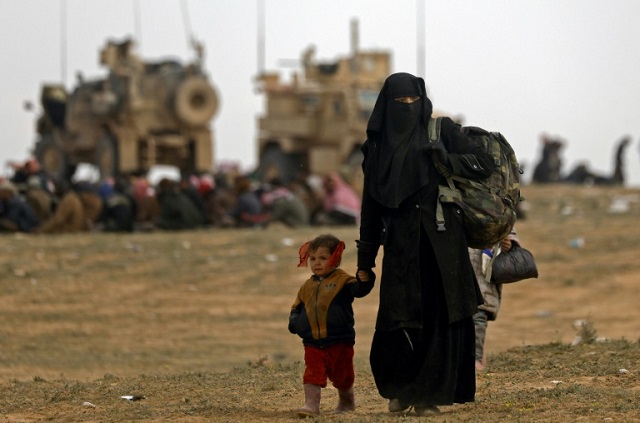
Paris, France | AFP | The imminent fall of the Islamic State’s caliphate in Iraq and Syria has left many countries grappling with what to do with jihadists who want to return.
Several hundred foreign jihadists are being detained by the Kurdish-led Syrian Democratic Forces (SDF), the main fighters on the ground combating the Islamic State. Added to them are women who have not taken part in the fighting and children.
Their home countries include Tunisia, Morocco, Saudi Arabia, Turkey and Russia — as well as France, Britain, Germany and Belgium.
– France: repatriation plan –
Around 50 French men and women, as well as 80 children, are being detained in Syria by the SDF.
Another 250 men were still at large in Syria in January 2019, along with women and children.
More than 300 French jihadists are believed to have been killed while fighting for the IS.
The French authorities say they want to avoid the jihadists scattering and have raised the prospect of repatriating the 130 nationals currently in SDF hands.
Details of the operation are unclear.
– Belgium: ‘case by case’ –
Out of more than 400 Belgians who went to fight with the jihadists since 2012, around 150 were still active in Syria and Iraq in late 2018. Added to them are some 160 children and adolescents born to at least one Belgian parent.
Belgium says it will help the repatriation of children younger than 10, as long as the link with one Belgian parent is proven. “For the others it is case by case,” the government says.
– Germany: ‘right to return’ –
A third of the more than 1,050 Islamists who made the journey from Germany to Syria or Iraq have returned.
“All German citizens, including those suspected of having fought for the IS, have the right to return to Germany,” according to the foreign ministry.
– Britain: ‘big threat’ –
By June 2018 almost 400 of the nearly 900 British jihadists who went to Iraq and Syria had returned, mainly women and children.
Forty have been prosecuted. Britain has also set up programmes aimed at deradicalising the jihadists.
In January 2019, London estimated at 200 the number of British jihadists still in Iraq and Syria. A top anti-terrorism official recently qualified their return as a “big national security threat”.
– Russia: no repatriation plan –
Nearly 4,500 Russian citizens went abroad to fight alongside “the terrorists”, the Russian security services said in early 2018. Some took their families with them.
Moscow has not announced plans to repatriate jihadists but since last year around 100 women and children, mainly from Russia’s Islamic republics in the Caucasus, have returned under a programme championed by Chechen strongman Ramzan Kadyrov.
In November 2018, however, Chechen activist Kheda Saratova accused Russia’s FSB security service of blocking attempts to bring back the remaining widows and children of Russian IS fighters.
“According to our organisation, there are over 2,000 of them left in Syria and Iraq,” Saratova, who is on Kadyrov’s human rights council, said at the time.
– Kosovo, Albania: prison –
Out of the 300 jihadists from Kosovo who went to Iraq and Syria, 145, half of them women and children, are still there.
Under a new law, the jihadists face between five and 15 years prison on their return. Some 20 imams have been selected to carry out deradicalisation programmes in prison.
In neighbouring Albania, 145 people, including women and children, went to jihadist zones between 2012 and 2014. The death of 23 of them has been confirmed and 45 have returned.
The Tirana authorities have carried out deradicalisation projects, including economic aid for returnees. Those recruiting jihadists face up to 18 years in prison.
– Morocco: jailed –
In 2015, the number of Moroccans fighting alonside groups in Iraq and Syria was estimated at more than 1,600.
On their return they are systematically arrested, put on trial and jailed. Sentences range from 10-15 years. More than 200 returnees had been prosecuted by mid-2018.
– Tunisia: return ‘via the justice system’
Between 3,000 and 5,000 Tunisian citizens are estimated to have gone to fight in jihadist organisations in Syria, Iraq and Libya.
The Tunis government is unwilling to help them return. “The Constitution provides for accepting all citizens, but they have to go via the justrice system and eventually prison,” President Beji Caid Essebsi said recently.
– Indonesia: surveillance –
Some 590 Indonesians who have joined the IS are still in Syria although the figure for Iraq is not known .
Those who return have to go through a deradicalisation programme, before being freed, but remain under surveillance.
 The Independent Uganda: You get the Truth we Pay the Price
The Independent Uganda: You get the Truth we Pay the Price



